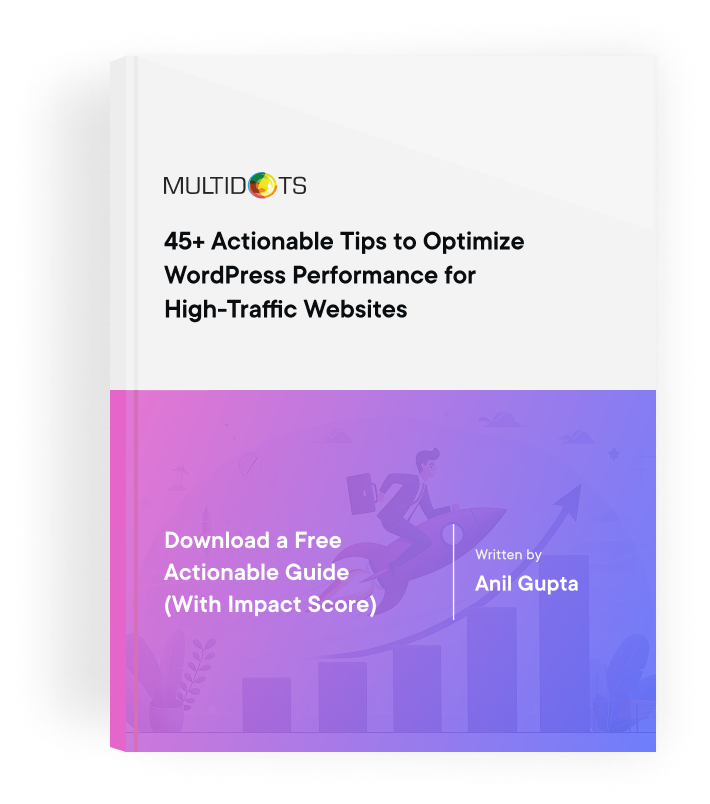The 5 WordPress Benefits That Make it a Leading Choice for Website Building – Business Perspective
Discover 5 compelling benefits of WordPress that make it the leading choice for website building in the business world

Table of Contents
No prizes for guessing that WordPress is one of the world’s most popular CMS platforms and recent estimates suggest that a massive 33% of websites across the world, run on WordPress. Think CMS and people think of WordPress. Compared to other content management systems, WordPress stands out for its flexibility, ease of use, and widespread adoption. There is a reason for this or to put it more specifically, many reasons why WordPress towers over other website development platforms.
WordPress programmers are in love with this platform because it makes it easier for them to build small, as well as, large websites. They can become more productive by developing websites faster and more accurately than ever before.
But purely from a business perspective, what are the WordPress benefits that can help your business grow? Because you aren’t really interested in why developers love WordPress or why it is the most popular CMS in the world. What you are interested in is how will WordPress bring more value to your business.
WordPress gives users the freedom to build, customize, and manage their own site. It is completely open source and free software, meaning there are no licensing fees and its development is driven by a global community. As open source software, the WordPress software is accessible to everyone and serves as the foundational tool for website creation.
The global network and community supporting WordPress ensures ongoing innovation and support. The freedom WordPress provides allows users to fully customize and control their sites without restrictions.
For these reasons, WordPress is widely recognized as the go to solution for website building.
Fair question.
Let’s find out some answers:
Introduction to WordPress
WordPress has established itself as the go-to content management system (CMS) for website owners across the globe, and for good reason. As a completely free and open source platform, WordPress gives users the freedom to build, customize, and manage their own site without the constraints often found in proprietary website builders. Over a decade of continuous development and innovation has made WordPress a trusted solution for millions of websites, from personal blogs to complex business websites.
One of the standout advantages of using WordPress is the complete control it offers. Whether you’re launching a new business website or looking to expand your online presence, WordPress empowers you to shape every aspect of your site’s design, functionality, and content. The vast WordPress community—comprising developers, designers, and other website owners—provides a wealth of resources, support, and inspiration. This collaborative environment ensures that no matter your level of experience, you can find guidance and tools to help your website thrive. With WordPress, you’re not just choosing a CMS; you’re joining a global network dedicated to helping you succeed online.
1. Flexible and Scalable to Meet Growing Business Needs
WordPress earned its stripes as a blogging platform in the good ol’ days when blogging fever (personal blogs) had taken hold of the public. Since then, it has evolved to support a range of online publishing use cases and is satisfying the website needs of diverse businesses irrespective of size, scale or scope. With self hosted WordPress, businesses have full control over their sites, offering more customization and flexibility compared to hosted solutions.
One of its biggest benefits is that it can be used to build a small online store and can be scaled to meet the needs of huge, full-service ecommerce stores as well. It has very few limitations from the flexibility perspective and the people behind WordPress have taken cognizance of the fact that a business’ needs change and its website must be flexible and adaptable enough to walk hand-in-hand with these changes.
WordPress scalability can be appreciated by taking a look at some of the sites that are built on this platform. Names like MIT Sloan Management Review, Georgia State University, Rolling Stone, The Walt Disney Company, Vogue, and The Obama Foundation stand out but we haven’t even scratched the surface yet. If you take a closer look at these names, you will see that these websites need to be configured for growth.
Let’s look at WordPress scalability through an example:
If you have a website that delivers outsourcing services, and you see this website growing rapidly after a given point of time, your first to-do item will be to get a web hosting plan with horizontal scaling. Choosing a hosting account that matches the needs of your target audience is crucial for performance and accessibility. As your site grows, you will need to access and manage your website files through your hosting account for advanced customization. Something else you must do after your website traffic really takes off is make use of performance-enhancing plugins such as caching and optimization plugins. These include WP Super Cache, WP Rocket, and more along the same lines. Advanced users with coding knowledge can further customize their sites for advanced features and additional functionality. The whole idea behind scalability is to get rid of traffic bottlenecks so that your website is able to deliver optimum performance 24x7, 365 days a year. As your business grows, you can also integrate business tools and support online stores using WordPress plugins and themes.
Installing WordPress is a straightforward process, making it easy to get started.
2. Themes, Themes and Even More Themes
A huge benefit for businesses is the never-ending themes that are available for WordPress. The sheer popularity of WordPress has resulted in designers and design companies churning out themes that suit the needs of businesses irrespective of their domain, interest, preferences or expectations. This is a big plus, moreover these themes are designed by experts who are extremely proficient in producing the right kind of graphical interface that empowers the website. WordPress theme developers focus on mobile responsiveness and ensure compatibility with mobile devices, so your website looks great and functions well on any screen size.
A WordPress theme defines the look and feel of your site, this includes design, layout, colors, navigation and other website elements that come together to offer an impressive user experience. There are themes available for technology sites, personal sites, culture-specific sites and so on and so forth.
Typically, the right theme is one that has the ideal feature set for a website belonging to your domain. Let’s take the example of a small business website. The right theme, in this particular case, should have the following features:
- WooCommerce integration
- Responsiveness
- Custom Widgets
- Image Sliders
- Header Layouts
- Active Customer Support
Many modern themes are also compatible with popular page builders, allowing for flexible and easy design customization.
…… And anything else that ties in with your business website needs.
As a business owner, you might have a set of ideas around how the website should look like and the overall website experience it needs to deliver. You convey these thoughts to the WordPress developer. All a WordPress developer must do is go through the plethora of themes available on the market and show these to you. You pick the theme that suits you best.
You will have the option of choosing from free and premium WordPress themes. Premium options often include enhanced customization, unique features, and better design control. In addition to premium themes, you can also purchase premium plugins, which offer advanced features and superior customer support compared to free alternatives. Investing in a premium plugin can significantly extend your website’s functionality and ensure you have access to dedicated support.
No prizes for guessing that a free theme will have a limited set of features, while a premium theme will go the distance. Now, you might think, why should you pay more money when the theme is available for free.
Not a bad thought to have.
But consider this – many free themes are not compatible with the latest version of WordPress. Also, most free themes offer really basic SEO, which is not good for any business website. And lastly, as we mentioned before, premium themes come with all the latest features, which will help your website stay ahead of its competitors. Themes and plugins work together to provide modularity and extensive customization, making it easy to tailor your business website for current needs and future growth.
3. Extend Functionality through Plugins
All WordPress sites that show superior functionality are empowered by plugins that deliver the features the website needs. A WordPress plugin offers specific functionality that website owners want their website to deliver, making it easy to add advanced features and additional functionality without custom development.
Considering the ever-growing WordPress community, there is no dearth of plugins and there is one for every need. The WordPress plugin repository is a vast source of free plugins and more plugins, allowing you to extend your site with a wide range of features. What’s more, any WordPress website is immediately compatible with any plugin; so, as a business owner, if you think you need a particular feature, all you need to do is go to WordPress or the plugin site, pick the plugin, install and enable it.
Using more plugins can provide additional functionality and advanced features for your website, such as analytics, contact forms, or secure payments, all without the need to code it in and hope that it performs seamlessly. It will do so, effortlessly, because that’s what WordPress is all about. And that’s not all - if you don’t need that functionality, all you must do is deactivate that plugin.
Here are some plugins that enable extended functionalities:
PushEngage
This is an ecommerce plugin that helps businesses leverage the power of push notifications and analytics tracking to drive sales. PushEngage is available as a free plugin with premium upgrades for advanced features.
OptinMonster
This is a marketing toolkit that can help you build your email list and reduce your website abandonment rate. The focus is on showing the right popup message to website visitors at the right time, to drive more conversions. OptinMonster is a premium plugin.
WPForms
Your website needs contact forms so that your prospects can get in touch with your business. With this WordPress forms builder creating a customer form is as easy as a simple drag and drop. WPForms offers a free plugin version (WPForms Lite) and premium options for more advanced features.
Remember, a website will evolve over time. This means you will activate/deactivate plugins throughout this lifecycle.
As your website grows over time, it becomes harder and harder to find your content. For example, if you have lots of blog posts then customers will struggle to find older ones.
You can improve navigation by installing the Posts Table Pro plugin. This handy plugin lets you create searchable, filterable tables displaying any type of content from your site. For example, a lot of people use it to create an index of blog posts, case studies, events, or other custom post types.
4. Built-in Content Centricity
A huge reason for migrating to WordPress is that it is a content management system and you therefore don’t have to worry one bit about ease of content publishing. All WordPress websites come with a blog feature that is easily accessible from all devices and which can be used at the back end to publish the blogs you want. From the WordPress dashboard, users can create posts and manage every blog post with ease. Publishing or updating content can be done in just a few clicks, making the platform extremely user-friendly. Also, updating website copy and images is a breeze and website owners don’t really have to make any effort to make any change as they deem fit.
This ease of use from the content perspective means business owners are not developer-dependant when it comes to updating the website. They can take control of the site and optimize its use.
5. Ever Growing WordPress Community
This is one of the benefits that is unbeatable and incomparable. WordPress is a free and open source platform supported by a growing community of WordPress-loving developers and designers. This huge community includes WordPress experts who provide support, guidance, and share their knowledge with users of all levels. They keep ensuring that the WordPress source files are up to date and secure. Also, if at any given point of time, they face any issue with WordPress, the larger community is always there to help. Other WordPress users, such as freelancers, site maintenance professionals, and brand advocates, often contribute or offer services, making the WordPress experience even more valuable. As a website owner, this will give you kind of confidence you need to make an investment in a WordPress site.
Website management is a complex task at the best of times and becomes all the more difficult when you are facing certain problems. As a business owner, you have a choice. You can go back to your website developer to sort out the problem or look through the free support, tips and advice available through the WordPress community. There are also many WordPress training resources and learning opportunities to help you build your skills and resolve issues efficiently. Choosing the latter (first) makes sense, as you might be able to sort out your problem free of cost. You can also search Google for quick solutions, tutorials, or plugin recommendations, which is a common and effective way to access extensive resources and support.
As a business owner, you can go through the WordPress Codex and document pages to look for helpful tips on how to further improve website performance. You also get confidence in your WordPress website knowing there are so many people whose advice you can use if anything goes wrong, and that the huge community and other WordPress users are always contributing to a better overall WordPress experience.
Performance Optimization: Site Speed and Security
For any business website, performance is more than just a technical detail—it’s a critical factor in user satisfaction and search engine success. A fast-loading WordPress site keeps visitors engaged, reduces bounce rates, and signals to search engines that your site is reliable and user-friendly. WordPress users have access to a wide range of caching plugins, such as WP Rocket and W3 Total Cache, which can dramatically improve site speed by storing static versions of your pages and reducing server load. Optimizing images, minimizing code, and enabling browser caching are additional steps that can further enhance website speed.
Security is equally important for website owners, especially as online threats continue to evolve. WordPress regularly releases updates to its core software, addressing potential vulnerabilities and keeping your site protected. However, proactive website owners can take security a step further by implementing strong passwords, limiting login attempts, and installing dedicated security plugins like Wordfence or MalCare. These plugins offer features such as malware scanning, firewall protection, and real-time threat detection, giving you peace of mind that your WordPress site is safeguarded against attacks. By prioritizing both site speed and security, you ensure your website delivers a seamless, trustworthy experience for every visitor.
Search Engine Optimization: SEO Friendly Features
Achieving strong visibility on search engines is essential for driving organic traffic and growing your business online. WordPress is designed with search engine optimization (SEO) in mind, making it easier for website owners to climb the rankings on Google and other search engines. The platform’s clean, well-structured code provides a solid foundation for SEO, allowing search engines to efficiently crawl and index your site’s content.
WordPress users can further enhance their SEO efforts with powerful plugins like Yoast SEO and All in One SEO Pack. These tools simplify the process of optimizing page titles, meta descriptions, and keywords, while also offering guidance on content readability and internal linking. WordPress also enables you to create custom URLs, add alt text to images, and use header tags to organize your content—all important factors for search engine optimization. By leveraging these SEO-friendly features and best practices, website owners can boost their site’s visibility, attract more organic traffic, and establish a stronger online presence in their target market.
Conclusion
If you already have a WordPress website, congratulations, you have made a wise decision, but if you don’t, you must use WordPress migration services and move your website to its new WordPress home.
Schedule a consultation call and discuss your migration requirements.
Contact Us
